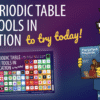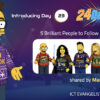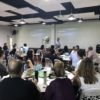
I remember 1980 well. It was a time of fluorescent socks and real technological innovation. I remember vividly walking to school at 6 years old without a care in the world and the promises of the future. Now That’s What I Call Music was about to be given to me for my 7th birthday in the March (on vinyl) and I dreamt of owning my own cassette player. All the amazing performers wore their headphones on their Sony Walkman and it was at that time I realised that new technologies excited me.
My teachers at Dinglewell Junior School were my world. I loved learning from them. The exploratory journeys that opened my eyes and imagination to the world of learning were magical. Learning through music, singing and the stories told by the amazing Mr Long were brought to life with his animated storytelling. We used to be in awe at the opportunity to watch a television programme as part of an activity. It would happen only once a year as I recall.
I remember writing out my learning lines in lessons which often saw me in competition with others in the class to be the first to finish. Years rolled in to the other all too quickly and before I knew it I was sat in my 11+ exam, not really understanding what it was all about although my parents told me it was very important. I remember looking across the table at a friend thinking ‘what on earth are we doing? Will this exam decide our future?’ He was busy scribbling away answering questions with his head firmly pointed down towards the desk, so I stopped daydreaming and got on.
I must have done ok because my senior school was a select entry grammar school for boys and thus my life changed inexorably. Soon gone were the experiential, amazing learning experiences and the fabulous storytelling of Mr Long. Now I was at a school where learning was all geared towards those select few who would move on and make it to Oxbridge. Still in my own day dream world however I just kept going. I did what I was asked. I turned up to school. I did the work set in class (from the book). I was never really stretched, other than to ensure that I did as I was asked. The teaching methodologies employed involved us all being sat in rows at desks from the 1950’s with space for ink pots on them for us to fill up our fountain pens. Teachers would say to us “you boy, in the blue blazer” to a) instil the fear of God in us, or b) really show us how they knew us inside out in support of our personalised education… oh no, that can’t be right! By now I had my own Walkman (I now wanted a Discman) and I used to enjoy listening to the charts that I had lovingly recorded from the radio (honing my editing skills by pressing the record and stop button at the right times to miss out the DJ talking).
I sat my GCSE examinations and I was surprised that I did pretty well. Was this a reflection on the didactic teaching style of my teachers (who literally did have their teacher desk on a pedestal) or of my coasting and no real effort or being given any kind of challenge? I’ll leave that for you to decide. The point I’m making about teaching, learning and experiences in school is that things now are absolutely nothing like they were when I was at school.
In education today we have teachers connecting in ways that weren’t previously thought possible – a key element of personalised CPD that so many forward thinking practitioners are engaging in. They are hanging out on Google and recording their conversations for the world to see on YouTube. They are engaging in action research and book clubs to help extend their professional development. They’re blogging and sharing the highs and lows of their teaching careers. They are sharing ideas and not reinventing the wheel. They are attending TeachMeet events. They are organising Pedagoo events. They are starting teaching and learning revolutions. They are influencing Ofsted. They are influencing education policy. They have the ear of the Department for Education. They may well be in your school and you don’t even know. They could be using these ideas and transforming teaching in their classrooms. They are Teacher 2.0.
What’s in store next with Teacher 3.0?














O levels in1980, College of HE formy degree and started teaching career by end of the decade. Technology has made communication with others easy on a global scale.
I am lucky to have taught so far in the 80s, 90s, 00s, and now 10s – like that I have and continue to adapt – teacher.flexible or lifelong learner in practice.
That’s the way it should be Andy – ever day is a learning day. Dylan Wiliam said ‘Every teacher fails on a daily basis. If you are not failing you are just not paying attention. Because we fail all the time.’
Thanks for taking the time to comment 🙂